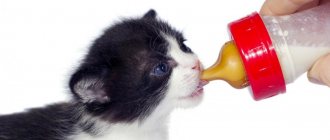The appearance of a furry baby in the house is a joyful event. But what if the kitten scratches or bites, leaving bleeding marks on its arms and legs? Some cat owners simply find this behavior of this charming little creature amusing. They specifically try to tease the pet so that they can play “fight” later. This is a big mistake.
Firstly, bites and scratches of even a small kitten are dangerous: they can cause infection, even serious forms. Secondly, before you know it, the young pet will turn into an adult cat. An aggressive cat in the house is a big problem, especially if there are children in the family. Therefore, you should not indulge your pet’s manifestations of anger, but rather correct his behavior from an early age.
Why does a small kitten bite and scratch?
There are several reasons why a baby may show claws and bite, and they are not always related to play.
Game or communication
The game is one of the likely reasons. If a small pet is bored, then it can choose the owner’s hands or feet as a play object, thus encouraging him to communicate. In this case, the solution is obvious: avoid contact with your hands, take a suitable toy and spend some time with your baby.
It's good if you can work out with him long enough for him to lose pent-up energy and get tired. After the game, treat him to something tasty, and most likely he will go to bed.
Aggression
A fluffy growing up at home may exhibit play aggression at the level of instinct. For this reason, the kitten often bites the hands and feet of the owner, following its innate characteristics. These are natural traits of the cat family, which manifest themselves even in an environment where the young creature does not have to hunt and get its own food by attacking the prey.
Sometimes aggression can be a manifestation of certain character traits in accordance with the breed or characteristics of growth and upbringing. Teenage kittens often get into a playful frenzy and seriously injure a person, simply forgetting themselves. In any case, the owner should think about options for weaning his pet from such games.
Illness or fright
It happens that a usually friendly and affectionate pet begins to show a bad character. In this case, you need to rule out possible health problems. Show your baby to the doctor and get the necessary tests.
It happens that the baby is simply tired and does not want to play - there is no need to disturb him, otherwise he may react with an outburst of anger. The same situation is possible if you accidentally hurt him, for example, by stepping on his tail.
In a situation where a pet is frightened by something (a sudden change in the situation, the appearance of an unfamiliar animal on the territory), it can instinctively use its teeth and claws. This is a defensive reaction. Try to calm the baby down.
The feeling of protection is very important for a cat. It’s good if he has his own house in which he can hide and feel safe.
Teething
Teething is another reason for uncontrolled biting. Kittens change their teeth between the ages of 3 and 5 months – it is at this time that they are the most biting. In such a situation, special toys with catnip, which can always be purchased at a pet store, will come in handy. The kitten bites them and thus scratches the itchy gums.
Recommended age for weaning a kitten from its mother
The optimal age for a kitten that they plan to adopt is 2-2.5 months. Such pets are more intelligent, independent and can already recognize the intonation in the owner’s voice.
Instinctively, both small and adult animals use their claws and teeth as a defensive response. A person can correct an animal's behavior with patience and persistence.
Character is formed in childhood, and if attacks on owners are not immediately stopped, then it will be very difficult to correct the behavior of an already adult animal.
Punishment and training are not suitable here; cats are only able to perform those actions that they themselves want.
How to stop a kitten from biting and scratching during play
Whatever the reason why the kitten scratches during play, the owner should think about how to wean the pet from dangerous games without harming the animal or causing even greater aggression and mistrust. Cats are known to be very touchy animals. And it is necessary to look for a more careful approach to kittens so as not to negatively affect their further development and worldview. There are several ways to stop a kitten from biting and scratching during play.
Switching attention
At an early age, kittens’ attention is very easy to shift to other, more interesting objects. Such objects can be rustling, rattling or glowing toys: rattles, balls, lumps of paper, bows on a string and other similar things. The furry baby will very quickly switch to a new game and stop biting your hands or feet.
If this option doesn't work, you can try audio distraction. As soon as the kitten begins to show aggression, you need to sharply and quickly say: “No” or “That’s enough” and loudly hit the table or any hard object. This should distract the pet’s attention and transfer it to the toy - or at least cool down the play ardor.
Often, sound techniques are enough for the kitten to understand that they can only bite toys - and not your hands. For some, it is necessary to repeat the techniques many times - it all depends on the pet’s temperament.
Developing bad associations with the bite
When using this method, it is important not to forget about humanity.
Bad associations in cats are usually caused by water, a light slap, loud pops, screams, etc. As soon as the kitten has bitten you, try gently spraying it with water from a spray bottle, making a loud unpleasant sound, slapping it on the back of the body with a rag or rolled up paper .
In order for the method to work well, it is necessary to deliver unpleasant sensations only after a bite and in no other cases - otherwise the pet will become confused and will not understand the true reason for the punishment. After several times, the animal will associate the bite with unpleasant consequences, and this will quickly become a habit of behaving more calmly.
Stopping the game
Kittens perceive the end of play as the end of fun. This way you can show the kitten that he did something wrong. While the pet is frolicking without biting or other signs of aggression, you should play with it according to its rules and not stop playing. As soon as your pet begins to show aggression, you must immediately end the game and go to another room, leaving the prankster alone.
This is how the kitten will understand that after a bite, the fun and games stop and the owner leaves, therefore, there is no point in biting. This method will only work if the game is stopped precisely after the manifestation of aggression - otherwise the kitten may incorrectly assess the situation, and the educational aspect will disappear.
Burst of energy
Sometimes kittens become aggressive due to lack of activity. This happens especially often in animals living in apartments or other cramped spaces and not having the opportunity to express their energy and instinctive impulses.
In this case, the owner needs to provide the active pet with a large number of toys and buy him a scratching post - or better yet, a whole play complex. In this case, the fluffy will devote more time to playing with them and will stop showing aggression towards the owner and other inhabitants of the house.
When you come home from work or after a long absence from home, try to give your pet the maximum jog and play with him using his toys. This will help solve the problem of attacks on arms and legs.
By the hands
Who is guilty
The most common reason for a kitten biting your hands may be that it is separated from its mother too early. A mother cat conveys to her growing offspring the information that the owner is an object worthy of respect: he feeds, cares for and warms, consoles if the pet is sad, and gladly joins in the game if you want to have fun. Some cats trust a person so much that they literally hand the children into his hands - they drag them onto his lap, sit next to him, and for the next one or two months the owner turns into a nanny. Kittens raised in such conditions will never show aggression towards humans. Even if they grab your hand while playing, the claws will not be released.
It’s a completely different matter if a kitten less than two months old comes into the house. A particularly difficult case is when the baby grew up on the street or with owners who perceive the cat as a tool for catching rodents: they keep it on the street and do not even give it a name. It can be extremely difficult to tame such kittens, because humans are their enemy. It will take all your gentleness and a lot of patience before the baby stops hiding under the sofa when you appear and defending himself from the hand that is trying to pet him.
Another important point: not all cats like to be petted. For many, it is enough to sit next to them, purring peacefully and looking with adoration at their beloved owner. Well, that's their right.
Often, scratching and biting your hands is a signal that the kitten is unpleasant about your actions. Animals aren't the only ones who can lose themselves while playing. Often the person himself pats the cat and grabs it by the face. In this case, I would like to advise you to imagine that you yourself are grabbed by the face. It is unlikely that you will be pleased. Such a gesture will provoke aggression in anyone in 100% of cases! Kittens especially don't like having their tummy rubbed. Aggression in response to such behavior is just an instinct of self-preservation. The abdominal cavity is the most vulnerable place in all representatives of the cat family; damage to it threatens the animal’s death. Therefore, the kitten, scratching and biting your hand with all its might, is simply defending itself.
Sometimes we can accidentally hurt our pet. Excessively active stroking, especially against the fur, rough (in the cat’s opinion) touch – all this forces the small predator to defend itself. It also happens that a kitten is in pain, and you made it even worse with a careless gesture.
What should you do if your kitten bites and scratches due to aggression?
If you manage to find out that the kitten scratches or bites precisely because of aggression, it is necessary to find out its reasons, and only then select methods of education. The most common form is play aggression, and in this case it is necessary to choose easy and unobtrusive methods of education - switching attention or stopping the game.
It is much more difficult to deal with aggressive behavior in cases not caused by the game. This could be stress, competition with another pet or with a small child, resentment, lack of attention and much more.
In each situation, it is necessary to select an approach in accordance with the reason. For example, in the case of a lack of attention, you need to devote more time to your pet - play with him at every opportunity that arises, show affection and love.
If the reason lies in jealousy, you should show the little owner that the object of jealousy is not a threat to him and your attitude towards the four-legged animal has not changed.
If the kitten has experienced stress, it is important to be patient with its condition and try to help cope with the changes that led to nervous shock. It is very important for kittens to feel safe.
The most difficult case is a wild, untamed animal from the street. The owners will need months of patience for the baby to get used to the person and stop using his teeth as protection against him. The game will be worth the candle: usually street animals grow into gentle, delicate and grateful creatures.
Useful tips
The aggressive behavior of a furry couch potato is a serious problem in keeping an animal. Experts recommend adhering to the following recommendations when re-educating:
- If an animal has sunk its teeth into a hand or other parts of the body, you should not break free to avoid further injury. In order for a cat to independently release the object of its aggression, it should be distracted by a sharp sound.
- Small kittens should only be played with using special toys and devices.
- At the moment of the bite, you should spray the cat with water, flick it on the nose with your finger, or throw a towel over it.
- In the question of how to wean a cat from biting when you pet it, you should not impose your attention, much less play, on an animal that is naturally unsociable. This category also includes pregnant females and nursing mothers.
Knowing the reasons for aggressive behavior, the owner should use the correct methods of raising it. If biting and scratching is caused by pain or stress, then the help of a specialist is needed. Every owner can correct the behavior of a domestic aggressor. Patience and consistency are the guarantees of teaching your pet good manners.
Video
What mistakes should you not make?
In the process of education, owners often make gross mistakes that are not beneficial, but harmful. What needs to be taken into account in the process of weaning a kitten from aggression in play or behavior:
- Under no circumstances should physical punishment be used. This can only aggravate the aggression and intensify it. A small pet may hold a grudge and begin to bite and scratch to protect itself or to show its owner its displeasure.
- It is necessary to be systematic in education. If educational measures are applied every once in a while, the kitten may not understand when and why he was punished, and in the future may not perceive the owner’s actions as educational.
- You should not use physical force to force a kitten to overcome fear and stress. These actions may have the opposite effect. The baby may become more aggressive towards the owner, who forces him to face the fear or stressor face to face.
Always be kind and patient. Even the most wayward animals can be trained if their owners have kind hands and a heart of gold.
Aggression caused by affection
Many owners believe that the cat bit or scratched them “unexpectedly,” “suddenly,” “out of the blue.” However, experienced cat owners are able to recognize an impending threat in advance and predict the cat's behavior.
Let's take a closer look at this process together. The owner begins to stroke the cat, ruffle its ears, or lightly scratch its head. The cat responds to affection, relaxes and purrs.
Then after a while we see that the cat tenses impatiently and begins to twist its ears in different directions.
Often, this is where the owner doesn’t notice anything, or even starts stroking harder, trying to calm him down. But this is a signal of danger. At the same moment, the animal’s pupils may dilate.
And the cat, with a quick, almost imperceptible movement, rushes forward with its claws extended and inflicts a wound on the person. In this case, the cat may suddenly and very strongly bite the hand with its teeth. Then he rushes away with lightning speed, as if fleeing in panic.
In essence, this behavior is characteristic of an animal that senses serious danger and defends itself. Having inflicted a wound and expecting immediate reprisal, the cat hurries to hide.
But where does she get the feeling of danger when in contact with an owner who behaves quite peacefully?
Methods for adult cats
Animal psychologists practice an integrated approach. Remove factors that irritate cats and create a comfort zone. Don't tease the cat. Avoid sudden movements and sounds in the presence of a cat so that its hunting instinct does not turn on.
It is easier to educate if the rules include conditional punishments. For example, punish for every bite. This way the cat will develop an association: a bite is a punishment. If one bite is punished and another goes unnoticed, the cat will continue to act out. Use a sharp sound or water as punishment. There must be a minimum gap between punishment and misconduct. The cat will develop an association between the bite and the immediate sharp pop or spray of water from a spray bottle. If a British cat tries to bite, you must immediately spray it, loudly adding: “You can’t.”











